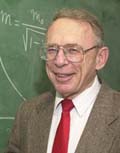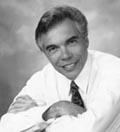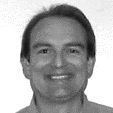 The Jefferson Lab Fall Science Series kicks off Wednesday, Sept. 18, with Robert Ehrlich, noted scientist and author of 19 books. The George Mason University professor will be discussing the issues he raises in his most recent book, "Nine Crazy Ideas in Science: A Few Might Even Be True."
The Jefferson Lab Fall Science Series kicks off Wednesday, Sept. 18, with Robert Ehrlich, noted scientist and author of 19 books. The George Mason University professor will be discussing the issues he raises in his most recent book, "Nine Crazy Ideas in Science: A Few Might Even Be True."
Some of possibilities he contemplates in his new book include: AIDS is not caused by HIV. Coal and oil are not fossil fuels. Radiation exposure is good for you. Distributing more guns reduces crime. These ideas make headlines, and most educated people scoff at them. Yet some of science's most important concepts-from gravity to evolution-have surfaced from the pool of "crazy" ideas. In fact, a good part of science is distinguishing between useful crazy ideas and those that are just plain nutty. In his book, Ehrlich, a well-known physicist with an affinity for odd ideas, applies his open mind to nine controversial propositions on topical subjects. Some, it turns out, are considerably lower on the cuckoo scale than others.
- http://mason.gmu.edu/~rehrlich/
- http://mason.gmu.edu/~rehrlich/books.htm
- http://mason.gmu.edu/~rehrlich/crazy.htm
 The October Science Series will present "Chemistry: It's More Than Puffs and Bangs!" It will take place Tuesday, Oct. 29, and feature Joe Schwarcz, from the McGill Office for Chemistry and Society, Montreal, Canada. He will conduct a series of educational and entertaining demonstrations that convey the excitement of science in general and chemistry in particular.
The October Science Series will present "Chemistry: It's More Than Puffs and Bangs!" It will take place Tuesday, Oct. 29, and feature Joe Schwarcz, from the McGill Office for Chemistry and Society, Montreal, Canada. He will conduct a series of educational and entertaining demonstrations that convey the excitement of science in general and chemistry in particular.
 The last event for 2002 is scheduled for Tuesday, Nov. 19, and will feature Kevin Pope, Geo Eco Arc Research, Aquasco, Md., presenting "Dinosaur Extinctions and Giant Asteroids." He will share the story of the Chicxulub impact crater, created 65 million years ago by the asteroid that wiped out the dinosaurs.
The last event for 2002 is scheduled for Tuesday, Nov. 19, and will feature Kevin Pope, Geo Eco Arc Research, Aquasco, Md., presenting "Dinosaur Extinctions and Giant Asteroids." He will share the story of the Chicxulub impact crater, created 65 million years ago by the asteroid that wiped out the dinosaurs.
- http://www.planetary.org/html/news/Italy/people/people/kevin.html
- http://www.planetary.org/html/news/Italy/
- http://geophysics.ou.edu/ahern/
All Science Series events begin at 7 p.m. in Jefferson Lab's CEBAF Center auditorium, located at 12,000 Jefferson Ave., Newport News. The presentations last about one hour with a question and answer period at the end. The events are free and open to anyone interested in learning more about science. For security purposes during Science Series events, enter at the Lab's main entrance (Onnes Dr.). Everyone over 16 is asked to carry a photo I.D., and security guards may perform vehicle checks.
For more information about Jefferson Lab's Science Series events, visit http://education.jlab.org/scienceseries/currentseries.html
For directions to JLab, visit http://education.jlab.org/scienceseries/map.html

